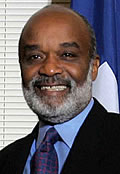Deportation Of Haitians From USA Mar. 28 2008
< Previous | Home | Next >
Mar. 28, 2008. A year after 102 Haitian migrants jumped from a flimsy wooden sailboat and splashed ashore on a condo-spiked beach in Broward, almost all of them have been deported to their homeland.
The migrants' detention ignited street protests, church sermons and hunger strikes, but even with all the noise, many observers knew the outcome: Almost all the asylum seekers would be returned to Haiti.
One man died desperately trying to reach shore.
Of the 101 migrants who remained, 80 have been sent back, according to U.S. Immigration and Customs Enforcement.
Fourteen juveniles were released to local family members.
Four were released on medical orders of supervision, and the others are facing removal hearings.
Immigration attorneys lament not seeing a change in policy since the Hallandale Beach landing but note a small victory: Each migrant had legal representation in the initial stages.
''At least they got their day in court,'' said Lisa Metellus-Hood, a Fort Lauderdale attorney who represented four migrants, all deported.
South Florida's Haitian community and its supporters have long objected to what they call unfair immigration laws. Under the so-called ''wet-foot/dry-foot'' policy, Cuban migrants who reach land can stay without asking for asylum, but those interdicted at sea are generally returned to Cuba. Haitians -- on land or at sea -- are routinely sent back.
Just as disturbing to many immigration advocates is that Haitian migrants are not eligible for temporary protected status, whereas other groups are. The TPS designation would entitle Haitian migrants to temporary residency and work permits for up to 18 months.
A year ago Friday, the crowded sloop landed off Hallandale Beach after 22 days at sea, the passengers subsisting on toothpaste and water.
A 24-year-old migrant, Lifaite Lully, drowned offshore -- his death a poignant reminder of the desperation so many Haitians feel to reach foreign shores.
Within 24 hours, a diverse group of attorneys mobilized to represent the new arrivals.
The pro bono legal team, led by the Florida Immigration Advocacy Center, included attorneys from Catholic Charities, the Haitian Lawyers Association, Church World Service, Haitian Woman of Miami and elsewhere.
Attorney interviews with migrants revealed a boat filled with family members and strangers, mostly men in their 20s and 30s. There was a five months' pregnant woman.
There was also a pastor, a carpenter, a teacher, a few involved in politics.
One attorney recalled how one of her clients had a gastrointestinal illness because of hunger.
Another battled night terrors.
One had bullet and stab wounds to his arms, torso and a leg.
''You really feel for these people,'' said Christine Reis, director of St. Thomas University's Human Rights Institute, which handled 20 of the cases.
``I think it was a matter of desperation.
.
.
.
What's the difference between risking your life there and taking a chance here?''
Attorneys also helped the mother of Lully secure a humanitarian visa to leave Haiti and attend her son's funeral service in Little Haiti.
Lully is the only person known to have died on the voyage; the Port-de-Paix native drowned just off Hallandale Beach.
These days, surrounded by copper-and-granite grave markers and pastel-hued bouquets, Lully's body is buried in an unmarked grave in a cemetery tucked between Opa-locka and Interstate 95. There are no flowers, only grass and dirt.
In the end, attorneys say many of the asylum seekers withdrew their claims, anticipating deportation or fearing prolonged detention.
One 21-year-old fisherman from Ile de la Tortue, a small island off Haiti's northwest coast, couldn't cope with detention, his attorney said.
''He couldn't emotionally or mentally take it anymore,'' Metellus-Hood said.
Metellus-Hood said her client dropped his claim after he learned that three of her other clients were already denied asylum by Immigration Judge Rex J. Ford.
''It was a huge part,'' Metellus-Hood said. ``He's a tough judge for anyone to go in front of.''
Ford referred questions to the Executive Office for Immigration Review.
A spokeswoman said she couldn't comment.
In addition to having his cousin, Lully, drown, Ricardo Francois saw his 27-year-old half-brother, Jean-Ferdinand Monestime, deported to Haiti on Jan. 9, he said.
''That's the way it is, you know?'' said Francois, a pizza delivery driver who lives in Hollywood.
``You can't do anything about it.''
Claudy, April 2 2008, 4:09 PM
Start a NEW topic or,
Jump to
previous | Next Topic >
< Previous | Home | Next >
< Previous | Home | Next >

 Rene Preval and Jean-Louis Debre
Rene Preval and Jean-Louis Debre  Presidents Rene Preval, Raul Castro, Daniel Ortega, and Leonel Fernandez
Presidents Rene Preval, Raul Castro, Daniel Ortega, and Leonel Fernandez  Rene Preval and Fidel Castro
Rene Preval and Fidel Castro  Bill Clinton in Haiti Palais National
Bill Clinton in Haiti Palais National  PHOTO: Haiti President Rene Preval and Bill Clinton in New York
PHOTO: Haiti President Rene Preval and Bill Clinton in New York  President Rene Preval
President Rene Preval  Rene Preval in Canada
Rene Preval in Canada  Rene Preval and Congressman Hank Johnson
Rene Preval and Congressman Hank Johnson  Rene Preval and Mahmoud Ahmadinejad
Rene Preval and Mahmoud Ahmadinejad  Rene Preval and Georges W. Bush
Rene Preval and Georges W. Bush  The Bush Administration Gave Its Deaf Ear To Haiti S President Rene Preval
The Bush Administration Gave Its Deaf Ear To Haiti S President Rene Preval  Trinidad Obama Dissed Preval Nouvelle Tournure New Twist
Trinidad Obama Dissed Preval Nouvelle Tournure New Twist  Rene Preval Sworn In As Haiti's New President, Jeb Bush
Rene Preval Sworn In As Haiti's New President, Jeb Bush  President Fidel Castro Hosts Haiti President-elect Rene Preval
President Fidel Castro Hosts Haiti President-elect Rene Preval  Rene Preval Haiti Djakout Mizik Pouvwa
Rene Preval Haiti Djakout Mizik Pouvwa 

